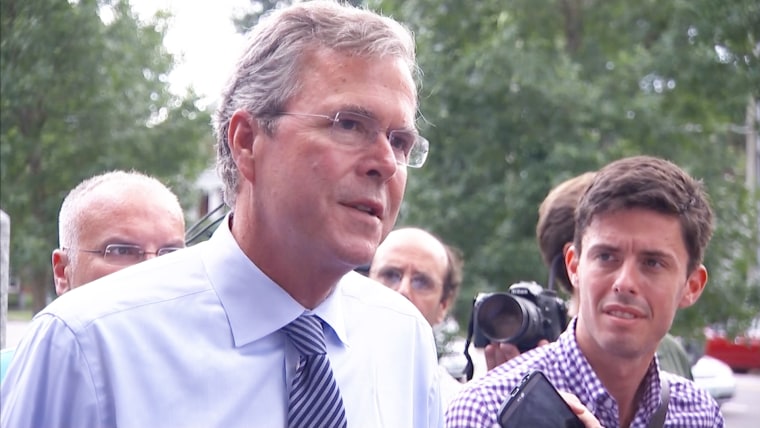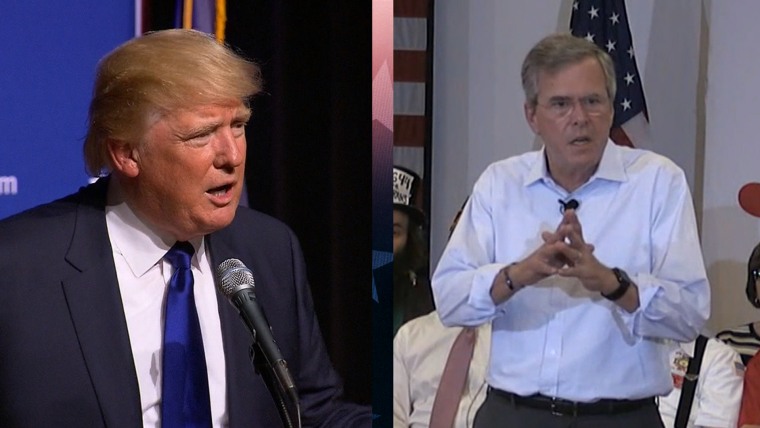KEENE, N.H. — Jeb Bush, as he often notes, co-wrote a book two years ago called “Immigration Wars,” laying out a path to reforming America’s immigration system. In the six chapters of the book, two phrases never appear: “sanctuary cities” and “anchor babies.”
But in a six-point immigration proposal he released earlier this month, the former Florida governor included a plan to crack down on cities that don’t cooperate with federal authorities on immigration law enforcement.
Now, Bush has invoked the term “anchor babies,” the idea that some women enter the U.S. illegally simply so they can have babies who are U.S. citizens, which might make it easier for those women and their families to then become citizens too. Many, particularly in the Latino community, find this phrase offensive.
These two new phrases in Bush’s lexicon raise two questions. Is Bush simply speaking clearly about policy challenges, as he and his aides argue, or pandering to anti-immigrant voters amid the rise of Donald Trump? And by using these phrases, particularly “anchor babies,” is Bush violating the informal pledge he made to “lose the primary to win the general" and taking steps that would make it harder for him to win a general election?
“No, it isn’t,” the candidate said here at a press conference, when asked if the phrase anchor babies is offensive.
Repeatedly pressed on the phrase, a frustrated Bush said, “give me another word” to use instead. He suggested describing the kids as children of undocumented immigrants was too long.
Bush is already being compared in some quarters to Mitt Romney, who in 2011 suggested the solution to illegal immigration was “self-deportation,” making life in the United States so difficult for undocumented immigrants that they chose to return home on their own.
But in reality, Bush, unlike Romney, has actually maintained most of his pro-immigration tone and more moderate stands on other issues, even amid the rise of Trump in polls. Bush continues to insist that he favors a pathway to legalization for undocumented immigrants. He this week defended granting citizenship to children born in the United States, even if their parents came here illegally, while several other GOP 2016 candidates aligned themselves with Trump’s call to rethink birthright citizenship.
Trump has criticized the Mexican government for its role in undocumented immigrants coming to the United States. But Bush, in the interview with conservative activist Bill Bennett when he referred to anchor babies, emphasized the close economic relationship between the two nations.
At town hall meetings in New Hampshire, whose population is overwhelming white, Bush promised to campaign in black churches and aggressively appeal to Latinos if he is the GOP nominee. He speaks a few sentences of Spanish in almost all of his speeches, making an unsubtle show of his connections to the Latino community.
On economic policy, the former Florida governor refuses to pledge he would oppose any tax increases while in office, even as many of the other GOP candidates have done so.
“I don’t,” Bush said, when asked by a voter at a town hall here if he thinks legal immigration was hurting the American economy.
He added, “Legal immigrants, once established, create two times more businesses than native-born Americans.”
This refusal to placate the GOP base may be adding to the challenges for Bush both nationally and here in New Hampshire, a state he is desperate to win. Bush was always expected to struggle with the conservative base of his party, and he is still struggling to illustrate how he would be different than George W. Bush.
But the surge of Trump, who leads polls even in more moderate New Hampshire, demonstrates how hard it will be for Bush to win the GOP nomination.
“He cannot out-Trump Trump. It would be foolish to try,” said David Karol, a University of Maryland political science professor who co-wrote an influential book called “The Party Decides” about presidential nominations.
“Jeb has to ride it out now and hope for the best,” said Karol. “But it will not go away.”
Bush, to be sure, has moved to the right during his campaign, and not just on immigration.
In 2011, as reported by the conservative National Review, Bush praised Obama and Secretary of Education Arne Duncan for pushing states toward higher education standards and accountability systems. Back then, the Obama administration was encouraging states to adopt the Common Core or similar standards in order to quality for the funds in the “Race to Top” program.
“I think Secretary Duncan and President Obama deserve credit for putting pressure on states to change, particularly the states that haven’t changed at all. They’re providing carrots and sticks, and I think that’s appropriate,” Bush said back then.
Now, Bush has strongly backed away from the idea that the federal government should have a role in pushing states toward standards like Common Core.
“This should not be federally-driven,” he said of education standards at a forum in Londonderry, New Hampshire on Wednesday. “The federal government should have nothing to say on this.”
Some analysts say Bush needs to take more steps in the direction of his party’s right.
“Bush is under-pandering in the primary,” said Brendan Nyhan, a political scientist at Dartmouth University who studies American politics. “Moving right would help him win the nomination and likely cause less harm in the general election than he appears to believe.”
Nyhan, citing a study of the 2012 election, argued the evidence is very limited that Romney’s “self-deportation” remark during the primaries was the cause of his weak performance among Latino voters against President Obama.
Bush’s decision to remain more in his party’s center is not simply about being viable in the general election. Republicans say that the emergence of Ohio Gov. John Kasich means Bush faces real danger of losing votes even in the more pro-immigration, moderate parts of the Republican Party.
“The thing that works in the traditional storyline [of past Republican primaries] is the Trump ascendancy,” said Ramesh Ponnuru, a conservative policy expert and writer. “It is in keeping with the tradition that the most conservative Republicans tend to split among candidates and waste votes with candidates who can’t win the nomination.”
Ponnuru considers Trump such a no-chance candidate.
He added, “what’s working against the traditional storyline is you don’t have the consolidation of the establishment and that’s what’s created the opening for Kasich and to a less extent Christie. They are coming straight of Bush’s” support base.

